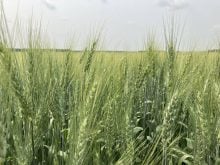A Saskatchewan grain farming company has launched a $50 million plus lawsuit against the Canadian Wheat Board.
Ben Hudye, president of Hudye Farms of Norquay, Sask., filed the lawsuit in Court of Queen’s Bench in mid-November, in the middle of the current CWB election period.
The lawsuit claims the board acted improperly earlier this year in a dispute with the company over the alleged delivery of an ineligible variety of wheat called 606 Granite.
The contract was downgraded and eventually voided under rules governing eligible varieties of Canada Western Red Spring wheat.
Read Also

Why feds imposed EV tariffs
Moe and Kinew have a fight on their hands when it comes to eliminating the EV tariff. Canada has to worry about pissing off the U.S. and Mexico and hundreds of thousands of auto workers.
The company is asking for recovery of $247,699 plus interest for improper loss of income and additional expenses related to CWB actions and legal courts.
It’s also claiming damages from the board totalling $25 million for serious damage to its reputation from “false and defamatory” public statements allegedly made by the board regarding Hudye’s business, along with $10 million for breach of fiduciary duty and $15 million in exemplary and punitive damages.
In announcing the lawsuit, Hudye said it is troubling that farmers in Western Canada don’t have a choice in where they can sell milling wheat.
“It’s the CWB or nothing,” he said. “I believe that farmers should be able to determine how and to whom we sell the fruits of our labour.”
CWB spokesperson Maureen Fitzhenry declined comment on the specifics of the case, because it is before the courts
“Having said that, no we don’t believe there is any basis for this case and we deny that anything improper has occurred,” she said.
Fitzhenry said the suit challenges the Canadian wheat quality control system, which is vital to the international reputation of Canadian wheat supported by the vast majority of farmers.
She said if the board and other industry players turn a blind eye to instances in which a farmer delivers an ineligible variety, all farmers will suffer the consequences.
She added 606 Granite is registered in Eastern Canada but has never been brought forward for registration in Western Canada.
Fitzhenry said the board will file a statement of defence in the future.
Hudye was a member of Farmers For Justice who in the mid-1990s was found guilty of violating U.S. Customs regulations by trucking CWB grain and herbicide across the U.S. border.
He was also part of a group of farmers and input suppliers who carried out high yield field tests, achieving dryland wheat yields of more than 100 bushels per acre in 1999.
ANATOMY OF A CASE
Here is the chronology to the case, according to Hudye’s court filings:
•In September 2009, Hudye filed a mandatory declaration with the CWB that all wheat it intended to deliver in 2009-10 would be of a registered CWRS class. Samples submitted to the Canadian Grain Commission confirmed that to be the case.
•Hudye then entered into an 8,625 tonne CWRS delivery contract with the board.
•In March 2010, Hudye began to deliver against the contract. After receiving 7,419 tonnes, the CWB advised Hudye that subsequent testing had determined that 122.5 tonnes was contaminated by an ineligible variety known as 606 Granite.
•The board downgraded the 122.5 tonnes to feed, then deemed the company to be in default of its contract, and claimed damages on the entire 8,625 tonnes, although 1,200 tonnes had yet to be delivered.














